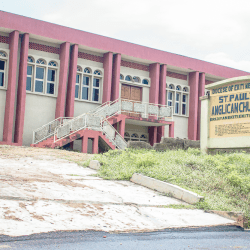The Ekitis, whose ancestors migrate from Ile-Ife as a people, form one of the largest ethnic groups in Yorubaland. Ekitis are culturally homogeneous and the speak a dialect of Yoruba language known as Ekiti.

The homogeneous nature of Ekiti confers on the state some uniqueness among the states of the federation. Slight differences are noticeable in the Ekiti dialect of the Yoruba language spoken by the people. This is informed and influenced by their spatial locations, especially the border communities to other states. For example the people of Ado local government area do not speak exactly the same dialect with the people of Ijero local government area, while the people of Ikole area speak something different from the people of Ikere area. The communities influenced by their locations include Otun (Moba land) that speaks a dialect close to the one spoken by the Igbominas in Kwara State.
The people of Okeako, Irele, Omuo-Oke speaks a dialect similar to that of Ijumus in Kwara/Kogi States. The people of Ekiti West and Efon-Alaaye local government areas, that is, the Efon Alaaye and Okemesi communities speak a similar dialect to that of Ijesas of Osun State. However , part of the uniqueness of the Ekitis is that where ever is your own part of the state, you will understand well, when the other Ekiti man/woman speaks, inspite of the dialectal variations. in addition, all towns in Ekiti State take a common suffix, “Ekiti,” after their names. the main staple food of the people of Ekiti is pounded yam with vegetable soup.
Ekiti as a people settle in nucleus urban patterns, well linked with network of roads. The State can boast of more than 127 large and small, ancient and modern towns, located on hills and valleys that characterise the state from which the confinement takes its name, Ekiti, that is, ‘Okiti’ meaning hill. Ekiti State, apart from the fact that it is the only state with a warm spring in Nigeria is the watershed and source of some prominent rivers such as Ero, Ose, Ogbese and others. The people of Ekiti are hard-working , upright, studious and very articulate. Ekiti men are predominantly farmers but women engage in trading.
Ekiti
Ekiti is a state in southwestern Nigeria.
Named after the Ekiti people, the Yoruba subgroup that make up the majority of the state’s population, Ekiti State was formed from a part of Ondo State in 1996 and has its capital as the city of Ado-Ekiti.



Ekiti State is a state in southwestern Nigeria, bordered to the north by Kwara State, to the northeast by Kogi State, to the south and southeast by Ondo State, and to the west by Osun State.
It was created in 1996 from the territory of the former Ondo State. The state is known for its rich cultural heritage, natural beauty and agricultural potential.
Ekiti is also home to some of some prestigious educational institutions in the country, such as the Ekiti State University, the Federal University of Oye-Ekiti and the Afe Babalola University.
One of the most popular destinations in Ekiti is the Ikogosi Warm Springs Resort, located in Ikogosi town. This resort is famous for its natural phenomenon of warm and cold springs flowing side by side from the same source. The warm spring has a temperature of about 70°C, while the cold spring has a temperature of about 37°C. The resort offers various facilities and activities for visitors, such as swimming pools, chalets, restaurants, conference halls, hiking trails and a museum.



Ekiti State has 16 Local Government Areas, namely:
- Ado-Ekiti
- Ikere
- Oye
- Aiyekire (Gbonyin)
- Efon
- Ekiti East
- Ekiti South-West
- Ekiti West
- Emure
- Ido-Osi
- Ijero
- Ikole
- Ilejemeje
- Irepodun/Ifelodun
- Ise/Orun
- Moba





Another attraction in Ekiti is the Arinta Waterfalls, situated in Ipole-Iloro town. This waterfall is one of the highest and most spectacular in Nigeria, with a height of about 120 meters. The waterfall is surrounded by lush vegetation and rocky cliffs, creating a scenic and serene environment. You can enjoy the view of the waterfall from a distance or get closer to feel its refreshing spray.
The Ekiti Cultural Centre in Ado-Ekiti, is a hub for cultural activities and events, such as exhibitions, festivals, workshops and performances. The centre also houses a museum that showcases various artifacts and relics from the past, such as pottery, beads, masks, costumes and musical instruments.
Ekiti is a state that celebrates its traditions and values. Some of the most notable festivals in Ekiti are the Udiroko Festival, the Ogun Festival and the Olosunta Festival. These festivals are held annually to mark different occasions and honor different deities. They feature colorful displays of costumes, dances, music and rituals that reflect the identity and diversity of Ekiti people.


